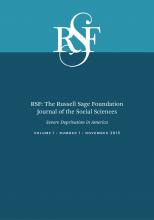Research ArticleII. Extreme Poverty and Social Suffering
Open Access
When There Is No Welfare: The Income Packaging Strategies of Mothers Without Earnings or Cash Assistance Following an Economic Downturn
Kristin S. Seefeldt, Heather Sandstrom
RSF: The Russell Sage Foundation Journal of the Social Sciences November 2015, 1 (1) 139-158; DOI: https://doi.org/10.7758/RSF.2015.1.1.08
Kristin S. Seefeldt
aAssistant professor of social work at the University of Michigan
Heather Sandstrom
bSenior research associate at the Urban Institute

REFERENCES
- ↵
- Avellar, Sarah, and
- Pamela J. Smock
- ↵Blank, Rebecca, and Brian Kovak. 2009. “The Growing Problem of Disconnected Single Mothers.” In Making the Work-Based Safety Net Work Better, edited by Carolyn J. Heinrich and John Karl Scholz. New York: Russell Sage Foundation.
- ↵
- ↵
- Carlson, Marcia J., and
- Frank F. Furstenberg
- ↵
- Castro Martin, Teresa
- ↵
- ↵
- ↵
- Desmond, Matthew
- ↵
- ↵
- Edin, Kathryn, and
- Laura Lein
- ↵Edin, Kathryn, and Laura Lein. 1997. Making Ends Meet. New York: Russell Sage Foundation.
- ↵Edin, Kathryn, and H. Luke Shaefer. 2015. Two Dollars a Day: Living on Almost Nothing in America. New York: Houghton Mifflin Harcourt.
- Floyd, Ife, and Liz Schott. 2013. “TANF Cash Benefits Continued to Lose Value in 2013.” Washington, D.C.: Center on Budget and Policy Priorities (October 21). Available at: http://www.cbpp.org/cms/?fa=view&id=4034 (accessed January 1, 2015).
- ↵French, Ron. 2012. “Welfare Reform: Back to the Drawing Board.” Bridge Magazine, March 29, available at: http://www.bridgemi.com/2012/03/welfare-reform-back-to-the-drawing-board (accessed May 1, 2014).
- ↵
- ↵
- ↵Kroft, Kory, Fabian Lange, Matthew Notowidigdo, and Lawrence Katz. 2014. “Long-Term Unemployment and the Great Recession: The Role of Composition, Duration Dependence, and Non-Participation.” Available at: http://www.korykroft.com/wordpress/KLNK_LTU_and_Great_Recession_june23_2014.pdf (accessed October 1, 2015).
- ↵
- Lichter, Daniel T.,
- Zhenchao Qian, and
- Leanna Mellott
- ↵Loprest, Pamela. 2003. “Disconnected Welfare Leavers Face Serious Risks.” Snapshots of America’s Families 3(7). Washington, D.C.: Urban Institute.
- ↵Loprest, Pamela. 2011. “Disconnected Families and TANF.” Temporary Assistance to Needy Families Research Brief 2. Washington, D.C.: Urban Institute (November). Available at: http://www.urban.org/sites/default/files/alfresco/publication-pdfs/412568-Disconnected-Families-and-TANF.PDF (accessed May 1, 2015).
- ↵Loprest, Pamela, and Austin Nichols. 2011. “Dynamics of Being Disconnected from Work and TANF.” Report to the U.S. Department of Health and Human Services (USDHHS), Assistant Secretary for Planning and Evaluation (ASPE). Washington, D.C.: Urban Institute.
- ↵Loprest, Pamela, and Sheila R. Zedlewski. 2006. “The Changing Role of Welfare in the Lives of Low-Income Families with Children.” Washington, D.C.: Urban Institute.
- Mauldon, Jane, Richard Speiglman, Christina Sogar, and Matt Stagner. 2012. “TANF Child-Only Cases: Who Are They? What Policies Affect Them? What Is Being Done?” Washington: U.S. Department of Health & Human Services Administration for Children and Families (December 11). Available at: http://www.cfpic.org/pdfs/TANF-Child-Only-Cases--The-Report-12-19-2012.pdf (accessed January 1, 2015).
- Miranda, Nannette. 2011. “Lawsuit Seeks to Stop Welfare Debt Collection from Children.” ABC7 News, November 30, available at: http://www.abc7news.com/archive/8450446/ (accessed May 1, 2014).
- ↵
- Ojeda, Norma
- ↵Ovwigho, Pamela, Nicholas Kolupanowich, and Catherine Born. 2009. “Disconnected Leavers: The Circumstances of Those Without Welfare and Without Work.” Report by the Family Welfare Research and Training Group. Baltimore: University of Maryland, School of Social Work.
- ↵Pavetti, LaDonna, Liz Schott, and Elizabeth Lower-Basch. 2011. “Creating Subsidized Employment Opportunities for Low-Income Parents: The Legacy of the TANF Emergency Fund.” Washington, D.C.: Center on Budget and Policy Priorities (February 16). Available at: http://www.cbpp.org/sites/default/files/atoms/files/2-16-11tanf.pdf (accessed May 1, 2015).
- ↵Rosenbaum, Dottie. 2013. “SNAP Is Efficient and Effective.” Washington, D.C.: Center on Budget and Policy Priorities (updated March 11). Available at: http://www.cbpp.org/cms/?fa=view&id=3239 (accessed January 1, 2015).
- ↵Sard, Barbara, and Will Fisher. 2013. “Chart Book: Federal Housing Spending Is Poorly Matched to Need.” Washington, D.C.: Center on Budget and Policy Priorities (December 18). Available at: http://www.cbpp.org/research/chart-book-federal-housing-spending-is-poorly-matched-to-need (accessed May 1, 2015).
- ↵
- Sarkisian, Natalia, and
- Naomi Gerstel
- ↵
- Sinkewicz, Marilyn, and
- Irwin Garfinkel
- ↵Stack, Carol. 1974. All Our Kin. New York: Harper & Row.
- ↵
- Turner, Lesley,
- Sheldon Danziger, and
- Kristin Seefeldt
- ↵U.S. Department of Homeland Security. 2009. “Public Charge.” Available at http://www.uscis.gov/green-card/green-card-processes-and-procedures/public-charge (accessed January 1, 2015).
- ↵Zedlewski, Sheila, Sandi Nelson, Kathryn Edin, Heather Koball, Kate Pomper, and Tracy Roberts. 2002. “Families Coping Without Earnings or Government Cash Assistance.” Assessing the New Federalism Occasional Paper 64. Washington, D.C.: Urban Institute.
In this issue
When There Is No Welfare: The Income Packaging Strategies of Mothers Without Earnings or Cash Assistance Following an Economic Downturn
Kristin S. Seefeldt, Heather Sandstrom
RSF: The Russell Sage Foundation Journal of the Social Sciences Nov 2015, 1 (1) 139-158; DOI: 10.7758/RSF.2015.1.1.08
Jump to section
Related Articles
- No related articles found.
Cited By...
- No citing articles found.









